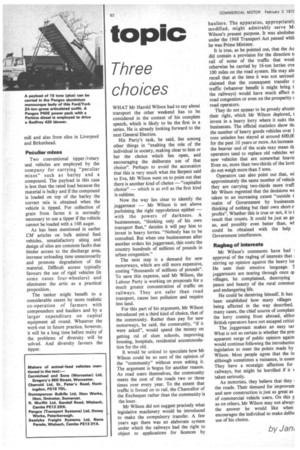topic
Page 64

If you've noticed an error in this article please click here to report it so we can fix it.
Three choices
WHAT Mr Harold Wilson had to say about transport the other weekend has to be considered in the context of his complete speech, which is likely to be the first in a series. He is already looking forward to the next General Election.
His Party's task, he said, lies among other things in "exalting the role of the individual in society, making clear to him or her the choice which lies open, and encouraging the deliberate use of that choice". Perhaps to avoid the accusation that this is very much what the Serpent said to Eve, Mr Wilson went on to point out that there is another kind of choice —"capitalist choice" — which is as evil as the first kind is sublime.
Now the way lies clear to identify the juggernaut — Mr Wilson is not above purloining the right opprobrious epithet — with the powers of darkness. A businessman, "thinking only of his own transport fleet," decides it will pay him to invest in heavy lorries. "Nobody has to be consulted. But when one businessman after another orders his juggernaut, this costs the country hundreds of millions of pounds in urban congestion."
The next step is a demand for new motorways, which are still more expensive, costing "thousands of millions of pounds". To save this expense, said Mr Wilson, the Labour Party is working on proposals for a much greater concentration of traffic on railways. They are safer than road transport, cause less pollution and require less land.
For This part of his argument, Mr Wilson introduced yet a third kind of choice, that of the community. Rather than pay for new motorways, he said, the community, "if it were asked", would spend the money on getting rid of slum schools, improving housing, hospitals, residential accommodation for the old.
It would be unkind to speculate how Mr Wilson could be so sure of the opinion of the "community" without even asking it. The argument is 'bogus for another reason. As road users themselves, the community meets the cost of the roads two or three times over every year. To the extent that traffic is forced on to rail, the Chancellor of the Exchequer rather than the community is the loser.
Mr Wilson did not suggest precisely what legislative machinery would be introduced to make the compulsory transfer. A few years ago there was an elaborate system under which the railways had the right to object to applications for licences by hauliers. The apparatus, appropriatel3 modified, might admirably serve Mi Wilson's .present purpose. It was abolishec under the 1968 Transport Act passed whilo he was Prime Minister.
It is true, as he pointed out, that the Ac did contain a provision for the direction t( rail of some of the traffic that woull otherwise be carried by 16-ton lorries ove 100 miles on the road system. He may als4 recall that at the time it was not seriousi claimed that the consequent transfer c traffic (whatever benefit it might bring t the railways) would have much effect o road congestion or even on the prosperity ( road operators.
They do not appear to be grossly abusin their right, which Mr Wilson deplored, t invest in a heavy lorry where it suits the businesses. The official statistics show tlt the number of heavy goods vehicles over 1 tons unladen has stayed at around 600,0( for the past 10 years or more. An increase the heavier end of the scale may mean th operators tend to replace old vehicles wi new vehicles that are somewhat heavi( Even so, more than two-thirds of the lorri do not weigh more than 5 tons.
Operators can also point out that, wi approximately the same number of vehich they are carrying two-thirds more traff Mr Wilson regretted that the decisions we taken to an increasing extent "outside t realm of Government by businessm thinking of nothing but their own short-r profits". Whether this is true or not, it is t result that counts. It could be just as go as, and possibly even better than, wi could be obtained with the help Government interference.
Ragbag of interests Mr Wilson's comments have had approval of the ragbag of interests that stirring up opinion against the heavy lot He uses their emotive language. 1 juggernauts are tearing through once qi villages, he complained, destroying peace and beauty of the rural commur and endangering life.
He could be deceiving himself. It has been established how many villages being affected in the way described. many cases, the chief source of complair the lorry coming from abroad, altha British operators have not escaped critici The juggernaut makes an easy tar What is not so certain is whether the pre; apparent surge of public opinion again; would continue following the introductioi legislation to meet the points made by Wilson. Most people agree that the lo although sometimes a nuisance, is essen They have a nostalgic affection for railways, but might be horrified if it r taken seriously.
As motorists, they believe that they , the roads. Their demand for improvem and new construction is just as great as of commercial vehicle users. On this r as on others, Mr Wilson may not alway: the answer he would like when encourages the individual to make dab( use of his choice.
















































































































































